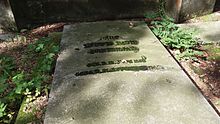Maximilian Yorck von Wartenburg
Count Hans Ludwig David Maximilian Yorck von Wartenburg (born June 12, 1850 in Klein Oels , district of Ohlau , Province of Silesia , † November 27, 1900 in Hai-lai , China ) was a Prussian officer , military attaché and historian .
Life
He came from the noble family Yorck von Wartenburg and was the son of the country nobleman Ludwig Graf Yorck von Wartenburg (1805-1865) and his second wife Nina (1824-1901), born von Olfers. On his father's side he was a grandson of the Prussian Field Marshal Ludwig Graf Yorck von Wartenburg .
In his youth Yorck was tutored by private tutors on his family's Silesian estate. After the death of his father, he moved with his mother and siblings to Berlin, where he attended the Royal French Gymnasium . One of his classmates there was Gotthilf Weisstein , who describes Yorck as a “fine, sensitive nature” who has “hidden the wealth of inner life behind a certain external harshness [and] silent rigidity”. Visually, he describes Yorck as a boy of "slim stature", with "an expressive head [and] long blond hair and shiny eyes", on the whole an appearance that had "something aristocratic, ruling about it".
On the occasion of the outbreak of the Franco-Prussian War in 1870, Yorck left school and joined a Uhlan regiment as an avantageur . With this he took part in the battles of Vionville , Gravelotte , Orléans and Le Mans . He was later trained at the War Academy in order to then take on duties in the Great General Staff .
In 1884 Yorck was sent to the German Embassy in Vienna as a military attaché , where he was responsible for maintaining the military relations between the German Empire and the Austro-Hungarian Dual Monarchy . In 1885 he was transferred to the military attaché in Saint Petersburg , where he stayed until 1893. From this post he played a role in the political disputes between 1887 and 1890, which ultimately led to the overthrow of Reich Chancellor Otto von Bismarck : As a supporter of the Chief of Staff Alfred von Waldersee , Yorck provided for him - as did the attachés in Vienna and Rome and Paris - with reports that cast a bad light on Bismarck's foreign policy - and thus indirectly its originator. Waldersee used these reports, which he gave to the young Kaiser Wilhelm II . submitted to stir up a mood against the Chancellor. In this way, the monarch was taken a little bit against his chancellor, which led to his overthrow. Yorck had already married in Samm Josephine von Bronikowski (1858-1924) in 1889 .
In 1893 Yorck returned to the General Staff with the rank of colonel , where he took over the management of the 1st department. He also taught as a teacher at the War Academy. Yorck also published some military historical writings. Among these is his world history in outlines , published anonymously in 1897 , for which the Count of Limburg-Stirum contributed the preface. In the GDR the book was included in the list of literature to be sorted out.
In 1900 Yorck was sent to China with the German expeditionary force to suppress the Boxer Rebellion , where he was killed in an accident ( carbon monoxide poisoning ). He was later buried in the family crypt of the Yorck von Wartenburgs in the castle park of Klein Oels.
Fonts
- Napoleon as a general. 2 vol., Berlin 1885–1886.
- Brief overview of the campaigns of Alexander the great. Berlin 1897.
- World history in outline. Pen-and-ink drawings by a German. A look back at the end of the nineteenth century. Berlin 1897.
- The advance of Russian power in Asia. Berlin 1900.
- Patriotic concerns. Two speeches and a letter. Berlin 1917.
literature
- Wilhelm Friedrich: Maximilian Count Yorck von Wartenburg. Berlin 1941.
- Hans F. Helmoldt: Count Maximilian Yorck von Wartenburg. in: Schlesische Lebensbilder. Vol. 3, 1928, pp. 336-343.
Web links
- Literature by and about Maximilian Yorck von Wartenburg in the catalog of the German National Library
- York von Wartenburg, Maximilian Graf von . In: East German Biography (Kulturportal West-Ost)
Remarks
- ^ Gotthilf Weisstein: Memories of the youth of Count Yorck. in: National newspaper. dated December 8, 1900 (morning edition), pp. 1-3.
| personal data | |
|---|---|
| SURNAME | Yorck von Wartenburg, Maximilian |
| ALTERNATIVE NAMES | Yorck von Wartenburg, Hans Ludwig David Maximilian (full name) |
| BRIEF DESCRIPTION | Prussian officer, military attaché and historian |
| DATE OF BIRTH | June 12, 1850 |
| PLACE OF BIRTH | Klein Oels , district of Ohlau |
| DATE OF DEATH | November 27, 1900 |
| Place of death | Hai-lai , China |


